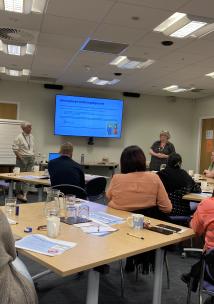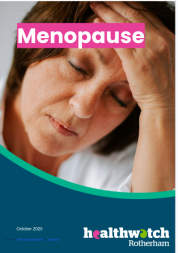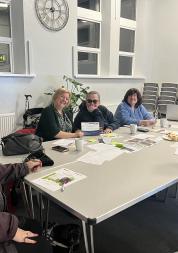In conversation with….Andrea & Kathy and all things menopause!

Andrea and Kathy have recently become Menopause Champions and Advocates and they ran this informal, inclusive event to raise awareness of what menopause is, how it affects lives and what support is available for those experiencing it.
The session started with a quick quiz to see how much knowledge those attending already had and the results were impressive! Awareness surrounding menopause has clearly increased from even a generation ago, when it was often talked about as ‘the change’ and women suffered the symptoms in silence. It was good to see that this awareness was across age groups - from those for whom menopause is many years away, to those currently going through the perimenopause, to those who are now postmenopausal. However, from the discussions happening around the room, there is obviously a need for a safe space for people to have open and honest conversations about what the menopause means for them.

Andrea and Kathy started the conversation off by giving some facts about menopause.
Did you know….
- You reach menopause when you’ve not had a period for 12 months
- The stages before that are called perimenopause and it is this that people often talk about when they say they’re going through menopause.
- Symptoms associated with both perimenopause and menopause can include:
- Anxiety
- Mood swings
- Brain fog
- Irregular periods
- Hot flushes and night sweats
- Dry skin and thinning hair
- Vaginal dryness
- Sleep problems
- Sore or tender breasts
- Reduced sex drive
- Headaches
- Weight gain
- Symptoms of perimenopause and menopause can last months or years and can change over time.
- Every person is different, some will experience no symptoms, some will get a few and some will have severe symptoms.
The group had a discussion about how this should be taught at schools as part of Personal, Social, Health & Economics (PSHE) lessons to help teenagers understand what their relatives may be going through. The irony that often mothers start going through perimenopause as their daughters start their periods wasn’t lost on the group! The hormone changes both go through can make home life challenging at times!
A question was asked about whether women who haven’t had children experience less menopause symptoms than those who have. The level of symptoms differs from individual to individual and whether you have had a child or not, does not appear to make any difference to this. However, studies have shown that those who haven’t haven’t given birth or been pregnant are statistically more likely to start going through the menopause earlier than those who have had a child. This is also true for those who started their periods aged 11 or younger [1]
The link between menopause and high cholesterol and blood pressure was also queried. Oestrogen has a protective effect on the heart and helps control cholesterol levels. As oestrogen levels drop as perimenopause starts, this protection is lost and as a result, the risk of high cholesterol, high blood pressure, coronary heart disease, heart attacks and strokes increases. A doctor can talk you through your individual risk, but there are things you can do to manage your risk and take care of your heart yourself [2]
How can symptoms be managed?
Andrea and Kathy went on to speak about things that can be done to help ease the symptoms of perimenopause and menopause.
Self help
There are plenty of self help techniques which can help people manage some of their symptoms. Some of these include:
- Getting plenty of rest and regular sleep patterns
- Eating a healthy diet
- Have calcium rich food like milk and yoghurt
- Exercise regularly
- Do relaxing things like yoga tai chi or meditation
- Talk to other people going through the same thing like family, friends, colleagues
- Talk to a doctor before taking herbal supplements or complementary medicine
- Sign up to cognitive behavioural therapy (CBT)
- Do not smoke
- Do not drink more than the recommended alcohol limit
The importance of exercise (especially weight bearing, impact and muscle strengthening exercise), healthy diet and eating plenty of calcium rich food such as milk and yoghurt was spoken about as bone density is affected by menopause. Oestrogen naturally keeps bone density stable, but as oestrogen levels drop during perimenopause onwards, this protection is reduced. Getting plenty of sunshine is good for you, but taking a Vitamin D supplement in the winter months is also recommended [3]
The Royal Osteoporosis Society has a risk checker that you can use to get a personalised report on your bone health: Bone health risk checker
The group spoke about the different things they do to help their physical and mental health. Activities such as walking the dog, gardening, swimming, going to the gym, cycling or just meeting up with friends are all beneficial to improve wellbeing and symptoms. The trick is to find something you love so that you stick to it!
If you need motivation or some new ideas Rotherham Healthwave offer a range of free activities to help get people moving: Rotherham Healthwave
With a large number of people who are menopausal being working age, the reality of dealing with perimenopause and menopause symptoms at work was discussed. Some of the symptoms individuals can experience can make work difficult, and although employers should have steps, procedures and support in place to help staff affected, it is not a legal requirement for them to have a menopause policy. The group talked about how employers making allowances for staff suffering from symptoms such as flexible working, breaks, providing fans and showers, would help staff feel valued and supported and would ultimately help employers retain valued employees.
Hormone replacement therapy
Finally, Andrea and Kathy spoke about hormone replacement therapy (HRT) and the role medication can play in managing perimenopause and menopause symptoms. We heard from the group differing experiences when approaching medical professionals about perimenopause and menopause symptoms, with some being dismissed and others being fantastically supported to find solutions that work the best for them. There is no right or wrong when it comes to whether to take HRT or not, it is individual choice, however, if it is something that you want to look into, speak to your doctor. A question was asked as to whether HRT leads to an increased cancer risk. HRT can slightly increase the risk of breast cancer but the increased risk is low and drops when you stop taking it. However if you have had breast cancer you will usually be advised not to take it [4]. As with any medication, you should discuss your suitability and risks with your doctor before taking it. Anyone taking HRT should have a follow up review after 3 months and then every 12 months after that if the treatment is working well.
More information on HRT can be found here: NHS HRT
Thank you to everyone who attended - there were so many questions, fantastic discussions and sharing of stories that we massively overran and could’ve kept going! It was brilliant to have such an engaged audience and we hope that everyone got a lot out of the event!
References:
[2] www.bhf.org.uk/informationsupport/support/women-with-a-heart-condition/menopause-and-heart-disease
[3] theros.org.uk/blog/2021-03-22-what-s-the-menopause-got-to-do-with-bone-health/
If you feel you need further help and support with perimenopause or menopause, speak to a healthcare professional such as your GP, nurse or pharmacist who can give you advice and help with your symptoms. There are also menopause specialists who have experience supporting anyone going through perimenopause or menopause. You can find your nearest NHS or private menopause specialist on the British Menopause Society website: BMS find a menopause specialist
There are also online resources available that have a lot of information and advice:
- henpicked.net/menopause-hub/
- menopausesupport.co.uk/
- www.nhs.uk/conditions/menopause/help-and-support/
- www.themenopausecharity.org/
- www.balance-menopause.com/
- www.lattelounge.co.uk/books-about-menopause/
- www.mymenopausecentre.com/menopause-stories/
- www.boots.com/wellness-advice/womens-wellness/menopause-stories
- healthwatchrotherham.org.uk/advice-and-information/2024-09-10/what-menopause-and-what-are-signs
- Vivup helpline call 03303 802059

